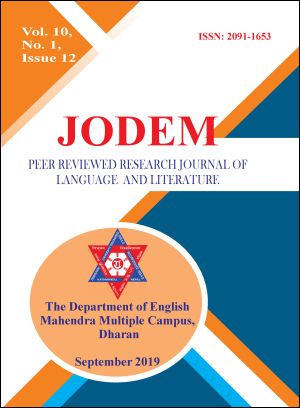Idealization of Gandhian Myths in Bapu Sonnets: Devkota’s Romantic Perspective
DOI:
https://doi.org/10.3126/jodem.v11i1.34802Keywords:
Admiration, commemoration, deification, controversy, romanticizeAbstract
Bapu sonnets were composed by great Nepali poet Laxmi Prasad Devkota just after the assassination of Mahatma Gandhi in India. Mahatma Gandhi used to be called ‘Bapu’ by the commoners of India and these 38 sonnets written on him are supreme examples in terms of the form of the sonnet; but in terms of the content, the sonnets romanticize Gandhi and his contribution to India and Indian people. Written in the heydays of Mahatma Gandhi’s popularity, the sonnets admire Mahatma Gandhi and deify him as a hero of Indian people. Mahatma Gandhi did play a great role in liberating India from British Raj but his role was controversial even in the Independence Movement of India and he became a more controversial figure in the subsequent years of his death. When these sonnets are read at the touchstone of how Gandhi is regarded today, they oversell Gandhi’s contribution, for he was blamed as caste-biased, religion-biased, gender-biased and class-biased person. In this article, I am making an argument that the sonnets make overstatement about Gandhi and praise him excessively.
Downloads
Downloads
Published
How to Cite
Issue
Section
License
© Department of English, Mahendra Multiple Campus, Dharan, Nepal

